Teacher Spotlight
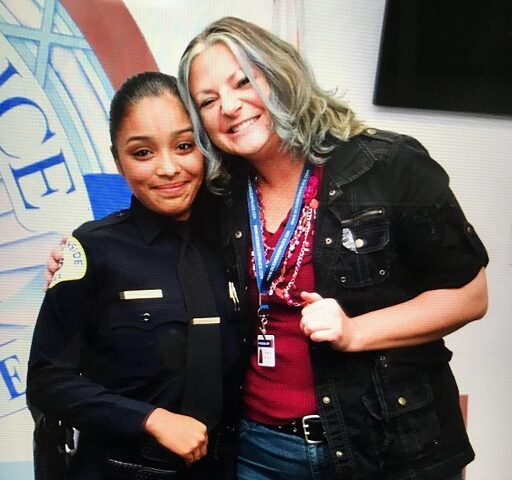 Chandra Faist
Chandra Faist
School name: Oceanside High School
School Website: https://www.rrgsd.org/o/rrhs
Program name/pathway:Academy of Justice
Life before teaching: Corporate business for Fortune 500 company. Decided to pursue dream of Criminal Law and after completed degree, applied to FBI. Got 9 months into the hiring process and heartbreakingly medically exempted due to a surgery. Went local with Oceanside Police, doing Beach Patrol during the summers and teaching Academy of Justice classes during the year. Best job ever!
Life outside of teaching: Divorced, 7 year old daughter named Carson, we LOVE adventures. Bought a house on the same street as my sister: we are inseparable. There isn’t a roller coaster that the three of us can’t conquer. We love to go dirt biking in the desert and stargazing from a tent in our backyard.
Interesting fact: I love to skydive
Briefly describe the student demographic you work with: Low Income school, very diverse (Hispanic is our largest demographic)
Share your successes in your program:When former cadets go on to become professionals in the industry: police officers, federal officers, correctional agents, legal secretaries, lawyers, etc.
What was your proudest moment as a teacher? When one of my former cadets asked me to pin her badge at her swearing in with Oceanside Police Department. I left an event 90 minutes away just to make the swearing in then returned to the event, that’s how important it was for me to pin that badge! (that moment is captured in that attached photo! Her name is Jelena Sosa, now Officer Sosa of Oceanside Police Department!)
What is the best thing about being a LPS teacher? Watching the moments where cadets perfect hands on skills, such as handcuffing, pat downs, field sobriety tests, fingerprinting, etc
What is your best advice for other LPS teachers? Partnership with an industry partner is KEY. Local police, state agency, any agency or department that is willing to provide guest speakers, tours, ride-alongs, assistance with hands on training, etc. I could not do my job well with out our partnership with Oceanside Police. They provide guest speakers, guest instructors, station tours, ride-alongs, etc. They are so supportive of AOJ!
What do you consider your expertise areas? Criminal and Constitutional Law
Can you share an email so people can reach out for advice? chandra.faist@oside.us
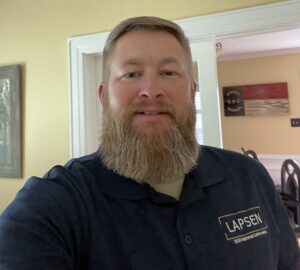 Joshua Clark
Joshua Clark
School name: Roanoke Rapids High School
School Website: https://www.rrgsd.org/o/rrhs
Program name/pathway: Law & Justice
Life before teaching: I went into the United States Marine Corps immediately after high school and spent four years as a field radio operator and scout observer in an artillery battalion. After the USMC, I worked as a part time 9-1-1 dispatcher while completing my Basic Law Enforcement Training. I spent 15 years in law enforcement with about 3 years as a criminal justice instructor and two years as a criminal investigator. I also lived and worked in Afghanistan for two years as a private contractor training and mentoring the Afghan National Police. I transitioned into secondary education in 2015.
Life outside of teaching: I lead a very busy life outside the classroom. I am the Injury Management Specialist / First Responder for the athletics department in our high school, so I attend all home sporting events as well as all practices and games for football. I am a licensed EMT and work many part time hours between two different EMS agencies. I volunteer with the Boy Scouts as an Assistant Scout Master and I am also an active member of a Masonic Lodge. I dabble in woodworking as a hobby, occasionally making money from it. Thankfully, I have a very supportive family. I have been married to my best friend for almost 19 years. We have three children: one in graduate school, one a senior in high school, and one in the 5th grade.
Interesting fact: I participated in a three day evacuation of the U.S. Embassy and 2,500 refugees in Sierra Leone, Africa in 1997. One of my prized possessions is a combat photograph of me during that operation.
Briefly describe the student demographic you work with: The demographic of my students is primarily middle to lower class.
Share your successes in your program: Each time I can make a positive connection or establish a positive relationship with a student is considered a success.
Discuss your challenges in your program: The challenges in my program are usually a general lack of interest in law enforcement among the student population. In today’s society, we battle that on the streets, but LPS teachers battle that in the classroom daily. I have to work harder than most CTE teachers to generate interest in my programs.
What was your proudest moment as a teacher? I am in my 7th year of teaching, and have begun seeing former students graduating college and entering the criminal justice field. Many of the local law enforcement new-hires have been former public safety or law & justice students of mine, and that makes me very proud of them.
What is the best thing about being a LPS teacher? I look at this as my contribution to community policing. I am inserting myself into the lives of our youth with hopes to influence or mentor to them in a positive way.
What is your best advice for other LPS teachers? Relationships, relationships, relationships! Build positive relationships with as many students as you can. Not only is it very rewarding for you, personally, but it can change the life of one of your students forever. The key to building relationships is to not be their teacher, looking down on them in hopes to bequeath them with all of your great knowledge. Do not talk at them as if you are better. Rather, you should talk to them, or with them. Be their mentor, their guide, their leader. You do not have to “show authority” by wearing your industry uniform everyday. I have found that my students are more receptive to “Mr. Clark” than they are “Officer Clark”. One more piece of advice: be authentic. These kids can see right through you if you are fake. Be direct, but compassionate and give grace.
What do you consider your expertise areas? I consider my expertise areas to be in teaching ethics & professionalism as well as the Bill of Rights/Con-Law
Can you share an email so people can reach out for advice? clarkj.rrhs@rrgsd.org
Shad Canestrino
Shad with his SkillsUSA medalist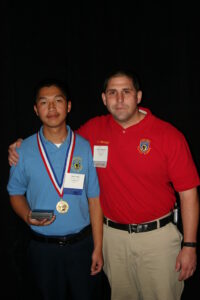
Program name/pathway: Administration of Justice / Public Services Pathway
Life before teaching: I have been a city police officer, Lodi/CA, for about 26 years. I am still currently employed as a police lieutenant and I am currently assigned as a Patrol Watch Commander. I have been teaching, part-time, in a high school level Administration of Justice class for about 17 years. I job-share with two other, retired police officers.
Life outside of teaching: Outside of the classroom, my life mostly consists of my work as a police officer. When I’m not working, I’m most likely to be found participating in community service projects and events with my kids. I am a BSA Assistant Scoutmaster and my son just recently completed his Eagle Scout Project. I am also a Key Club (Kiwanis Int’l) advisor to the Ben Hold Academy where my daughter is the Treasurer for the club. My first wife, Sundey, and I have been married for almost 20 years and she is currently employed as a RN. I also enjoy restoring classic cars, attending live rock concerts, traveling and free food.
Interesting fact: I have been a supporter of CTE (we used to call it ROP) for over 30 years. I competed in SkillsUSA (VICA at that time) in both the Auto and Diesel Mechanics competitions, and I have mentored students in SkillsUSA; in the Criminal Justice competition. Currently, I have 12 former high school students working with me at my police department.
Briefly describe the student demographic you work with: At the high school I work with 11th and 12th graders primarily. They come from several different “home” schools including 4 traditional high schools, continuation high schools, private high schools and charter schools. My classes are typically (historically) about 60% males and 40% females. Most of the students are in the middle to lower-middle class income brackets. The racial demographic is about 45% Hispanic/Latino, 40% Caucasian, 5% Asian, 3% African American, 7-8% other. For the last 15+ years we have averaged 90 to 100 students spread out across the three blocks we teach each day. This year’s enrollment is about 60% less than normal.
Share your successes in your program: I like to say that the difference between CTE and traditional academic programs in high school is that “CTE teaches the skills that pays the bills.” I currently have 12 former students working with me at my police department and many more spread across dozen of agencies across the United States.
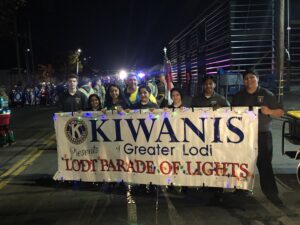
Shad encourages community involvement to grow his students and improve his program visibility.
Discuss your challenges in your program: Like everyone else the biggest challenges currently are constantly changing COVID rules, fear of COVID, and lower than normal enrollment. Over the last 17 years or so of teaching, i would say the greatest challenge in my program has been to have it recognized by CA POST as providing important skills for future criminal justice system employees.
What was your proudest moment as a teacher? I have two really proud moments. One was mentoring a student, who came from a very modest background, in the SkillsUSA competition as he won the state competition and then finished in the top half of competitors at the national competition. The other really proud moment I had was being present recently when one of my first students (first year I taught) promoted to sergeant at my agency. (Oh yeah, and having my oldest child in my class this year).
What is the best thing about being a LPS teacher? I think one of the greatest challenges and the greatest reward as a Law and Public Safety teacher, is being able to connect with young people and show them that the majority of police officers, and police agencies, are very different from how they are frequently portrayed by the media.
What is your best advice for other LPS teachers? I think the first thing I would say to those looking to enter a LPS teaching career is that just because you were a really good cop, doesn’t mean you’ll jump right into being a really great LPS teacher. Teaching is a skill that is learned and developed over time. Just like it takes time to really be good at being a cop, it will take training, education and effort to be a really good LPS teacher.
What do you consider your expertise areas? My areas of expertise are report writing (and reading), investigations, traffic collision investigations, traffic enforcement, firearms and ballistics evidence, special events, Constitutional law and patrol procedures.
Can you share an email so people can reach out for advice? scanestrino@lodi.gov
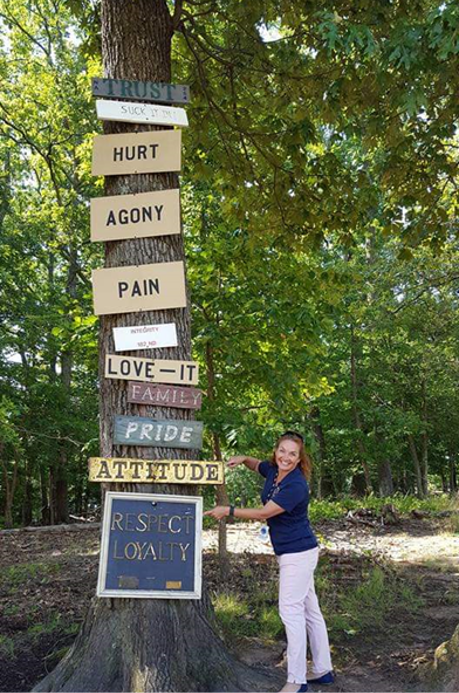
Stacey at Quantico
Stacey Hervey

Stacey at Quantico
School name: Career Education Early College and various colleges
Program name/pathway: Crime and Forensics
Life before teaching: I began my career as a Victim Advocate for Boulder Police Department. I then became a patrol officer but really really disliked working the night shift (I think I was a farmer in a previous life).
Life outside of teaching: I have two kids (one is a senior and another is at CU Boulder) so to adjust to the empty nest, adopted another dog to add to the zoo already in our home. I now have two dogs and a two cats. I like even numbers. When not working to pay tuition bills, my significant other and I love spending time outdoors in Denver and have seasons tickets to the CU games. I love football and an an avid Broncos and Buffs fan! I just turned 50 so bought myself an electric bike. We like exploring new restaurants and I can bike there and then have it “drive” me home. Colorado is a great place and if you ever visit, give me a call!!!
Interesting fact: I have a certificate in animal assisted intervention therapy which I have never used and plan on becoming a sommelier when I retire….
Briefly describe the student demographic you work with: I teach at both the high school and college level. My high school is a Title One school with 95% students of color. I also teach online at various colleges and universities where the students are more diverse-first generation, adults, military etc…I get a great mix of everyone and this allows me to also hear different perspectives.
Share your successes in your program: I have taught for over 20 years and have kids all over the country who have gone into law enforcement or public service. Many of my students are first generation and being able to expose them to careers that will immediately take them out of poverty has been very worthwhile. I have one student who grew up with siblings in gangs and wanted better for himself. He left the state to pursue a career as an officer and was very successful in a large urban department. He moved again and works with six officers and has his eyes on being the chief! I have another who moved to LAPD and just sent me his division shirt! Even if they don’t go into this field, I hope to share with them skills to critically view the world, understand their rights and responsibilities and work to change the world around them.
Discuss your challenges in your program: The biggest challenges right now are people who do not believe in policing. I have had several people in education share with me that they do not think I should be teaching young people to go into this field. The change must come from within and I feel that by exposing students to this career field they will be able to see the rewards that come with serving the public.
What was your proudest moment as a teacher? I thoroughly love teaching so hard to narrow down to just one. I think honestly it was during Ferguson when we critically examined the incident and my students staged a walk in instead of a walk out. https://kdvr.com/news/denver-teen-ferguson-native-urges-classmates-to-reconsider-protests/
What is the best thing about being a LPS teacher? I started attending conferences over 15 years ago and still have friends I touch base with. The camaraderie of this group is amazing and you couldn’t ask for better leaders with Dr. Washburn and Dr. Coffee at the helm.
What is your best advice for other LPS teachers? In the words of MLK “The function of education is to teach one to think intensively and to think critically. Intelligence plus character – that is the goal of true education.” The work is hard, especially during these trying times but so rewarding. Find a support group of teachers who are positive and support your work but will also challenge you to think outside the box and become a better educator. Don’t try to create everything. Reach out to people for help and adapt their lessons to fit your class. Teach your students how to think, not what to think and have some fun!
What do you consider your expertise areas? Criminal Investigations, Online course development, Hate Crimes and Juvenile Delinquency
Can you share an email so people can reach out for advice? crimeandforensics@gmail.com